Rough sleeping across Birmingham has reduced by two thirds thanks to the city’s response to the government’s call for ‘Everyone In’ which began at the start of the pandemic last March.
Today (Thursday 25 February), the government has released the official annual rough sleeper statistics for 2020.
In Birmingham, rough sleeping, as measured on a single night, has more than halved with 17 people recorded as sleeping rough in the 2020 count, compared to 52 in the previous year and 91 in 2018, a 67% reduction from the previous year
As a result of ‘Everyone In’ Birmingham City Council was able to accommodate all rough sleepers with a place in a Covid-19 secure, hostel or hotel. ‘Everyone-in’ was followed by the Next Steps Accommodation Programme, the Protect Programme, and the Cold Weather Fund, each helping with moves away from the street, and targeting those who might remain.
The count in Birmingham took place on the night of 19th November with partners and specialists taking to the streets to count. Birmingham City Council leads a multi-disciplinary partnership of voluntary and statutory services, this provides street outreach 7 days a week along with accommodation and help around poor physical and mental health, substance misuse, care and support needs. A key part to the council’s approach to addressing rough sleeping has been in its flexibility and willingness to adapt during the pandemic
Councillor Sharon Thompson, cabinet member for homes and neighbourhoods at Birmingham City Council, said, ‘This has been an unprecedented year so I particularly want to thank our partners across the city during what has been an incredibly testing time. The council, stakeholders, partners and community-based groups as well as our frontline staff and volunteers have done a fantastic job supporting people sleeping rough through the pandemic.
‘Whilst we have seen positive strides as a city and region, we have still not seen the true impact of Covid on homelessness which will only become clear after lockdown is lifted. The current economic downturn could have huge consequences when it comes to homelessness in the future. The government must prioritise prevention now to stop people becoming homeless in the first place.
‘We now need to work nationally together across authorities and government departments to prevent people going back on the streets or becoming homeless, especially important given the big rise in unemployment. This means learning the lessons from the pandemic and making services, national funding and policies fit for purpose so we can meet the new challenges that the next year will bring and put an end once and for all to rough sleeping on the streets.’





